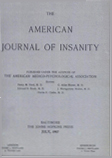IRREVERSIBLE OR HYPERGLYCEMIC INSULIN COMA
Abstract
1. Irreversible or hyperglycemic insulin presents a typical picture consisting of a sustained high blood sugar (following intravenous glucose administration), fever, rapid pulse and respiration and frequently fits, vomiting or diarrhea. It is a serious complication occurring not only in shock treatment but no doubt in the management of diabetes as well. It may result in death or in permanent brain damage, but recovered psychiatric cases often show dramatic improvement in their mental state. 2. Hyperglycemic coma is probably due to over-prolongation of therapeutic coma beyond an hour or an hour and a half. 3. Over-prolongation of coma is often unintentionally allowed, because the presence of gastric retention makes termination by tube feeding ineffective. 4. As a practical consequence coma should generally not be allowed to last more than an hour or an hour and a half, especially in cases that tend to rouse slowly, and sugar should be given by vein in all cases that do not begin to rouse 15 or 20 minutes after tube feeding. 5. Treatment of irreversible coma by intravenous glucose and blood transfusion of 500 cc. of citrated blood appeared effective in three successive cases. 6. It would appear that the whole blood contains substances, other than oxygen or sugar, essential for brain metabolism, which have been destroyed or depleted by protracted coma. 7. The dramatic psychiatric improvement in certain cases following prolonged coma suggests that if a safe method for prolongation of coma could be devised, it would further extend the value of shock treatment.
Access content
To read the fulltext, please use one of the options below to sign in or purchase access.- Personal login
- Institutional Login
- Sign in via OpenAthens
- Register for access
-
Please login/register if you wish to pair your device and check access availability.
Not a subscriber?
PsychiatryOnline subscription options offer access to the DSM-5 library, books, journals, CME, and patient resources. This all-in-one virtual library provides psychiatrists and mental health professionals with key resources for diagnosis, treatment, research, and professional development.
Need more help? PsychiatryOnline Customer Service may be reached by emailing [email protected] or by calling 800-368-5777 (in the U.S.) or 703-907-7322 (outside the U.S.).



